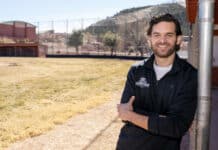“The Park Bench,” produced by Lion Forge Animation Studio, was one of two selected animated shorts at this week’s Sedona International Film Festival.
Lion Forge Animation was co-founded by Carl Reed and David Steward II in 2011 after their initial Lion Forge Comics began in 2006.
This short, focusing on a young girl as her father battles sickle cell disease, touched the animation studio’s vision as one of the only black-owned animation studios in the country. The short was also in partnership with Aflac, as the young girl is comforted by a duck — the company’s mascot — throughout the film.
The five-minute-long short will be screening on the 24th and the 26th at Harkins Theatre 1, starting at 1 p.m. and 7 p.m. respectfully. Reed talked with Sedona Red Rock News in anticipation of the film festival.
Q: How did you end up co-founding an animation studio?
“I previously worked in broadcast animation right before launching the comic studio. And from the beginning, I think David
and myself were like we want to tell these stories and we want to get this vision of having a well-rounded pipeline of creators and new perspectives, starting with comics and then back into animation. And we still produced a number of comics through the imprints in Lion Forge and Magnetic Press, with even more opportunities to tell stories.”
Q: When were you first sold on the short, ‘The Park Bench’?
“We didn’t know that it was for Aflac necessarily. We were reached out by a member of the team, who were some of the producers on the project. They basically gave us the general concept that it was surrounding care and sickle cell disease specifically, which I have some personal experience with my family. And one of our focuses at Lion Forge animation is kind of to make films that can touch you emotionally but also are significant.
“It immediately runs all of those bills. And so then later found out it was Aflac, and it made a lot of sense because it kind of highlights the other reactions and other side events that happen when a family is facing a medical emergency. But I’m glad that we were already 100% on board even before we knew that.”
Q: Rob Edwards is most well-known for his writing on Disney’s “The Princess and the Frog,” but was your experience working with him before this project?
“We have been trying to find a project to work on together for a minute. We had already had a little bit of familiarity with each other, but I hadn’t worked together before, so I think it was just the best because our full focus is content that challenges expectation and reflects the diversity of our audience. And Rob brings that in spades.”
Q: What message is this short conveying that you hope will be recognized by the audiences?
“I have an uncle that died early as a result of his sickle cell. I have some nieces that have sickle cell right now. And it’s an invisible disease. You never know that someone has it and that they’re in this pain. There are constant medical events and the weight of having a perpetual illness is something that not every family can manage. And how are children affected when their parents are always sick …? That’s kind of those driving [themes] of hope, the power of family and the power of care, whether it comes from the duck, whether it comes from the mom or whether it comes from the dad, once he’s able to be healthy enough to interact. All of those things shed light on those moments that, like sickle cell, are invisible to everyone else.”
Q: How does the short’s perspective from a young black girl translate to your studio’s goals as one of the only black-owned animation studios in the country?
“You know, some folks see diversity and inclusive content as just the right thing to do or a trend. But the way I see it, I see it as an advantage …. For years, filmmaking has been dominated, for a number of reasons, by predominantly white voices. And so over time, fresh voices from different perspectives feel so unique, so fresh and results in different content.
“So I see it more as a creative advantage than anything else. Yes, it’s the right thing to do. Yes, it’s where our industry needs, but also it makes for better content.”
Q: How do you important do you feel film festivals, like SIFF, are to you and your business?
“Oh, it’s tremendously important and valuable because there’s only so many slots on the major stage …. And there are creators and filmmakers and writers that are really shedding light on [issues] and news.
“Some of the greatest emerging and new writers that are huge now have come out of the film festival circuit because they were able to show their skill, their prowess, their stories and have a little bit of those messages that wouldn’t have been seen otherwise.
“You can’t do that without the film festivals and specifically those that showcase multiple mediums. Sometimes a short is just the right platform to tell a story and it’s not easy to do. Sometimes a full feature that may not have gotten wide exposure is a film company or studio or a broadcast or a distributor we’ll see at a film festival and pick it up.”




















